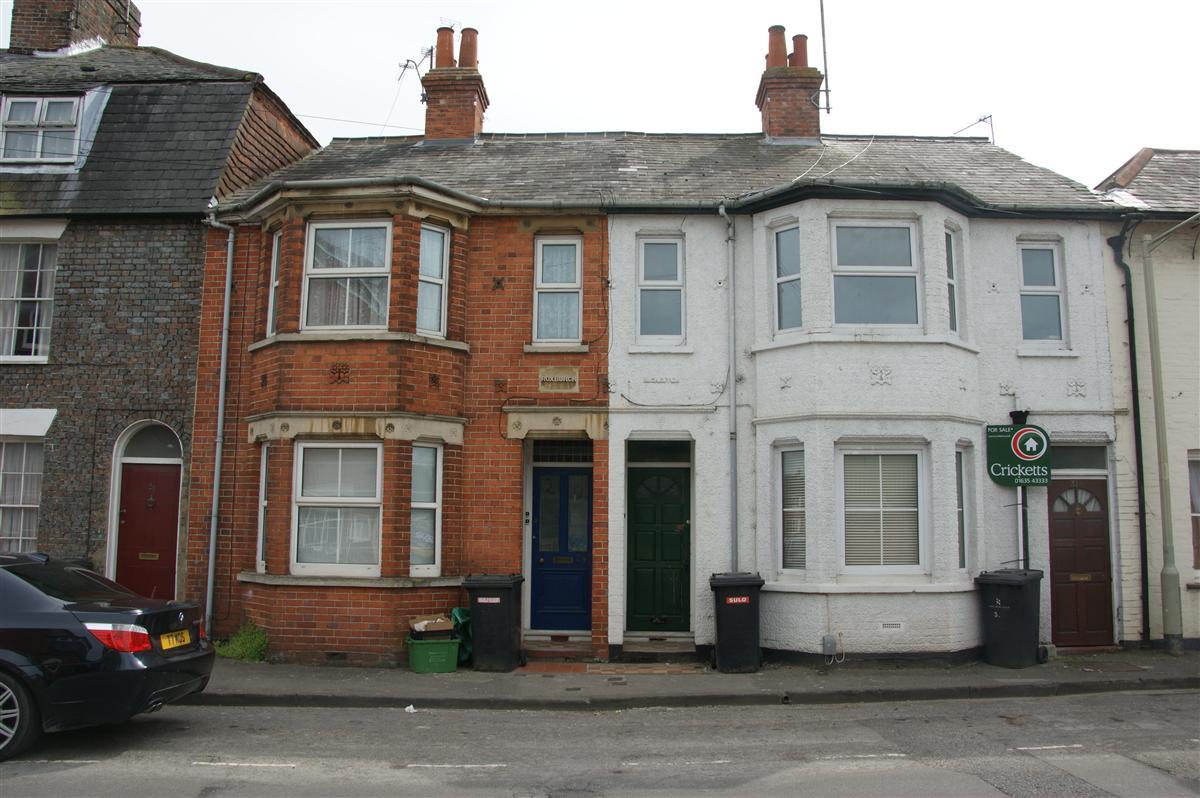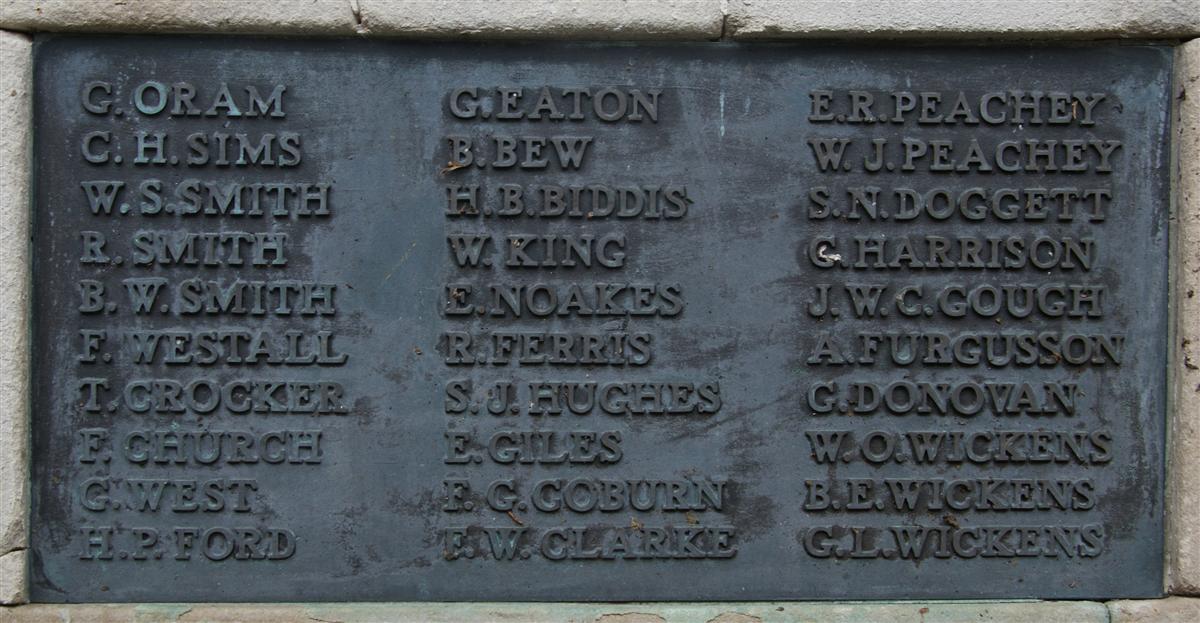William Oscar Wickens
Private 18271 William Oscar Wickens, 8th Battalion Royal Berkshire Regiment
William was born in 1887 in Shilton, Oxfordshire, the fifth of William Maisey Wickens’ nine sons (there were also three daughters). William married twice, his first wife (Ann Collett) was the mother of his first four children, all sons; his second wife Ellen (née Targett) being the mother of eight children born between 1884 and 1894 – William being her third child and first son.
William Wickens was a baker, grocer and sub-postmaster in Shilton (when William was born there in 1838 Shilton was in a detached portion of Berkshire, the country boundaries were rationalized in 1844).
 The family home in Enborne Road (now Pound Street). Ilchester is the white painted house on the right. |
The Wickens boys were apprenticed (which would usually be at the age of 14) into various trades; William and his younger brother Bertram learnt the drapery trade and found employment in Newbury as draper’s assistants.
In 1912 William married Wynne Phillips, a Welsh lass from Rhymney in Glamorgan. Their first child, Doreen, was born in early 1914.
When war broke out in August 1914 hundreds of thousands of young men rushed to sign up to ‘do their bit’. Most went into infantry regiments, usually their local county regiment. The regiments were able to create new battalions (approximately 1,000 men) to fill the needs of an overstretched army. These new battalions were known, officially, as ‘service’ battalions, unofficially they were ‘Kitchener’s Army’.
William did not sign up immediately but, after a few months he evidently determined that it was the right thing to do and enlisted in the spring of 1915. Two of his younger brothers, Bertram and Cyril were probably already in France (they arrived there with the 1st/4th Battalion, Royal Berks at the end of March). William’s service number suggests he signed on at around that time. Another brother, Gerald joined at the same time as William.
The brothers were almost certainly placed in the 9th (Service) Battalion of the Royal Berks; this battalion was being raised in order to take part as a front line battalion. However, in July 1915 it was converted into a traning battalion. In September 1915 the Wickens brothers were sent to France as reinforcements for the 8th Battalion, arriving in France on 30 September and reaching the 8th Battalion at Noeux-les-Mines, among of a draft of 52 men who joined the battalion on 4 October. The battalion was coming to terms with horrendous losses suffered in the opening days of the Battle of Loos – the CO (Maj C F N Bartlett) wrote to his predecessor that ‘Our casualties are very bad’ and reported: ‘Total strength 453 (for rations) Trench Rifles 317. I have 3 scouts out of 21, Bombers 53 out of 120, signallers 18 out of 32, Machine Gunners 28’. They had lost 17 officers and 500 other ranks (killed, missing or wounded).
Despite this the battalion was called back into the lines on 5 October. At 2pm on 13 October they went ‘over the top’ again - enemy machine guns soon stalled the attack. Stanley Giddings, from Newbury, a sergeant with the 8th Battalion wrote home:
Reading Mercury, 30 Oct 1915
We had our second flick at the Germans last Tuesday. We had been in the trenches for seven or eight days before we made the attack. This was only our second time in the trenches and, on each occasion, it had been pretty warm. There was one continual bombardment and the Germans never failed to answer with shrapnell or 'Jack Johnsons' We had our rum ration in the morning and then after a little meal (called dinner in civil life) we were ordered to put on our gas helmets. Some smoke bombs were thrown well out over the parapet of the trench. Then after a few minutes interval the first line advanced. Each man carried a pick and shovell, so that he could commence to consolidate the first German trench immediately they got there. The line advanced well and they got from 50 to 80 yards without a man falling. Then the Germans in the front line trenches started pouring machine gun fire into them and they had to lay low. A good many men were killed but the greater proportion were wounded. I saw one of our officers who had been wounded in the throat, and who afterwards died from it, lying down, peppering the 'Germs' with a few revolver pellets. He did some good work and I know the boys of his company were sorry to lose him. Another officer, a captain, was walking up the trench his company occupied and was heard to say 'Will you follow me Boys?' The men answered with one voice 'We will follow you anywhere sir!' The next minute they were over the parapet and rushing towards the German lines. But the poor officer did not get more than 50 yards before he was riddled with machine gun bullets. It put the devil into the men to see their captain fall and they went for it with the determination to kill the Huns or die themselves in the attempt.
The same newspaper printed another letter from a Private in the battalion:
Reading Mercury, 13 Nov 1015
It was the same old cry 'Come on the Berks' and over the top we went. When we got over, there was something waiting for us in the shape of German machine guns. They were continually sweeping the ground with them from one end of our line to the other. They fire from 500 to 600 bullets a minute so you can see it was pretty warm. When I got to within 20 yards of the German trench, as it was a bit too warm, I dropped down into a hole where a 'coal box' [a type of German shell] had fallen. There I had to lay, not daring to move so much as an eye lash, or it would have been my last move as there was a machine gun at work in front of me and snipers all round. To make it worse they had spotted me, for they had taken several pots in my direction, but I kept a bit too low for them. I had to stay there for four hours till it got dark so that I could crawl back to our trench. When I did move I thought my back was going to break as I had been so cramped up. As soon as it began to get dark I started crawling. I went backwards for the first 100 yards, watching the German trench all the time and then I turned round and had a go head first, expecting every minute to be made a pepper box of by bullets because they kept sending up 'starlights' and these made night as light as day. It took me two hours to cover 150 yards. But I thank God that I got back safely. To make it worse I had to lay beside dead comrades, one dying quite near me.
The officer writing the battalion diary noted ‘I attribute the failure of the attack to the inability of our artillery to silence the German machine guns, and to the complete absence of support’. At 2 am in the morning of the 14 October the remnant of the battalion were withdrawn. Another eleven officers and 142 men had joined the casualty list – including William. His active service amounted to 9 days.
William was one of the men listed as ‘missing’; leaving his family in suspense, hoping for news that he had been taken prisoner. Gerald survived this abortive action and continued to serve with the battalion until he was killed in action on 27 August 1916. When the local paper reported Gerald’s fate William’s was still undetermined:
Newbury Weekly News, 7 Sep 1916 p8 – Local War Notes
Mrs E Wickens, of “Ilchester”, Enborne-road, has just received the sad news that her third son, Pte G L Wickens, of the 1st Trench Mortar Battery, 1st Infantry Brigade, has been killed in action by shell fire. He leaves a wife and baby. Mrs C [sic] Wickens, who has had four sons serving at the Front. Last October it was officially reported by the War Office that her eldest, Pte W C [sic] Wickens, 8th Batt Royal Berks, was missing, and no news has since been obtained of him. He leaves a wife and two children. Her other two sons, who joined at the beginning of the war, are still at the Front in the 1/4th Royal Berks.
William's widow was awarded official administration of his estate when probate was granted on 30 October 1916. Evidently the probate authorities were satisfied that he was dead. He left effects to the value of £220. However, the War Office were still not convinced. It was another year before they gave up on William and officially notified the family of his death:
Newbury Weekly News, 12 Oct 1917 p8 – Local War Notes
The War office have notified Mrs Wickens, of “Alvescote,” Cromwell-road, Shaw, that as no further news has been received concerning her husband, Pte W O Wickens, of the Royal Berks Regt, who has been missing since October 13, 1915, they are reluctantly constrained to conclude that he was killed in action on that date.
 William's name on Newbury War Memorial - above those of his brothers. (bottom right) |
William has no known grave so his name is remembered on the Loos Memorial in the Dud Corner Cemetery just outside Loos-en-Gohelle. Locally he is remembered on the Newbury Town War Memorial.
Shortly after William’s death his wife, Wynne, gave birth to their second child, Phillip Oscar Wickens.
Five Wickens brothers went to war, all served in France and Flanders with the Royal Berkshire Regiment; William’s was the shortest period of active service; Cyril (b 1893) spent the longest time at the front, serving throughout the war with the 1st/4th Battalion he was in France for over three years. Bertram (b 1888) went out with Cyril, but was killed in 1917 during the German withdrawal to the Hindenburg Line. As already noted Gerald (b 1890) went out with William to the 8th Battalion, dying during the Battle of the Somme in 1916. The fifth brother, Raymond (b 1894) enlisted in November 1915 and joined the 8th Battalion in the field sometime in 1916, not long before Gerald was killed. Raymond survived the war living through the 8th Battalion’s darkest hours, when they were reduced to a total of 90 men and a few officers during the German Spring Offensive on 1918.
[Thanks to Karen Newbery for her help in researching this soldier.]

Find a memorial :
| Died this day: | |
| 02 March 1919 | |
| Ernest H H Youngs | |
| Theale |

Like this site? Show your appreciation through a donation to a great charity.